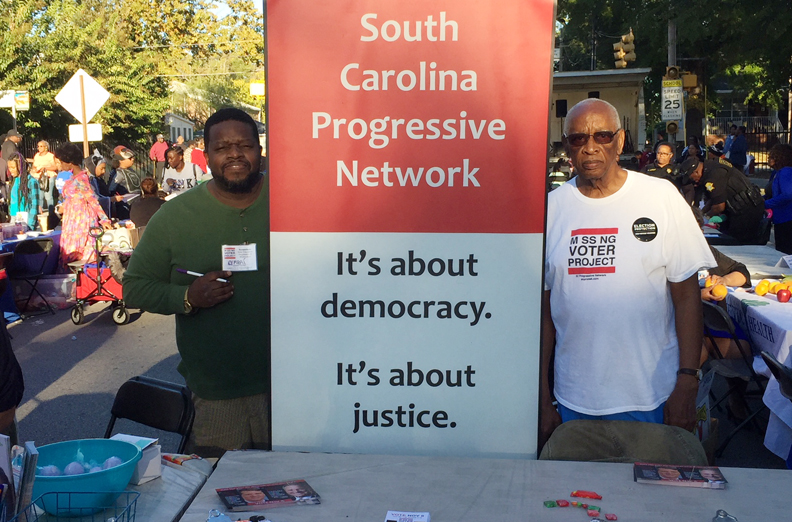While the results of the midterm elections are still unclear, there should be no dispute about who really lost: the voters.
From elections corrupted by money and gerrymandered districts, to faulty voting machines and unnecessary photo-ID laws, to parties using fear and outdated playbooks to mobilize their increasingly polarized bases, voters continue to be victimized by a broken system.
A bit of good news is that the election confirmed the value of the SC Progressive Network‘s strategy of civic engagement and long-term, grass-roots movement building led by people who understand this state’s history and its players. Over 22 years, we have grown a community of activists committed to addressing the root causes of our democratic rot, and mapping a better path that serves all of South Carolina, not just the wealthy, white, and well-connected. We do this every day of the year, not just during election season or legislative sessions.
While we found it a challenge to meet all the volunteer opportunities this election cycle offered, we did an impressive job of registering and mobilizing voters in targeted communities, starting relationships with individuals and organizations that we expect to strengthen in the coming months and years.
Our nonpartisan Missing Voter Project (c-3) and our individual membership’s (c-4) work this year again focused on what Dr. Martin Luther King called “the greatest of all injustices: the inequality in health care.” While the MVP went after unregistered voters, both efforts cited the state’s rejection of Medicaid expansion to cover a quarter-million of its most vulnerable citizens.
We did deep demographic work on registered voters being denied Medicaid funding, and crafted a message to them specifically. We printed 30,000 side-by-side comparisons of the gubernatorial candidates’ positions on expanding Medicaid, and distributed them in neighborhoods with densities of minority voters who had their health care stolen. We mailed 10,000 card to the three House districts that were won by the smallest margins in 2016, and made nearly 30,000 robo-calls to young black registered voters who didn’t vote in the 2016 election.
Rep. Gilda Cobb-Hunter, a founding member of the Network, recorded a call that went to our targeted voters. (You can play the call below.)
We invited recipients to call the Network for more information. Some 130 young black voters called, and spoke to Network Co-chair Omari Fox. “I was surprised by the amount of people in the dark about Medicaid expansion and their potential for health coverage,” Fox said. “Our democracy is sick, and our civic engagement can remedy that. I’m more determined than ever to educate, agitate, and organize.”
 Omari Fox (left) and Col. Tim Pearson work to register and mobilize voters at the Columbia Housing Authority’s Fall Festival.
Omari Fox (left) and Col. Tim Pearson work to register and mobilize voters at the Columbia Housing Authority’s Fall Festival.
Our most notable electoral win can be attributed in part to the 5,258 cards we mailed to voters in House District 121 letting them know that their health care is being denied by the current governor. J.A. Moore, the young black Democrat, beat Samuel Rivers, the legislature’s only black Republican, by 455 votes (3 percent) in a majority-white district. Moore was not involved in our voter mobilization campaign, nor were any of the other candidates who may have benefited from our work.
The Network also trained volunteers to help protect the vote in South Carolina on Election Day. Network Director Brett Bursey offered this summary just hours before the polls closed on Nov. 6.
